'It is important to understand that the disability is not in the person.'
' The problem lies in societal attitude and the discriminatory treatment given to disabled people.'
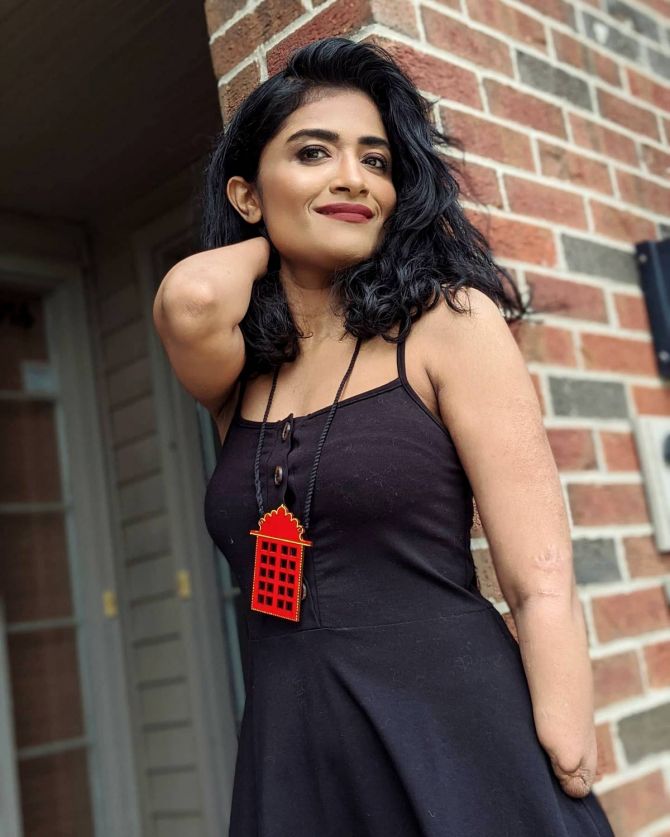
Currently, she works as a motivational speaker and is a disability rights activist and inclusive model promoting accessible fashion. Photographs: Kind courtesy Dr Malvika Iyer
Sit down for a moment and imagine that you are 13 years old and it's the summer vacation.
You're trying a quick-fix -- getting the torn pocket of your jeans to stick back on with Fevicol -- and need something to weigh it down.
You find a cylindrical object in the garage of your house; it seems ideal.
You take it to your bedroom and, the third time you press it down on your jeans, there's a blast.
Malvika Iyer could see her blood splashed all over her room; her hands were missing, but there was no pain.
So much so that, as she was being rushed to the hospital in the family jeep, she noticed her legs had almost been separated from her body. And alerted an uncle who was accompanying them.
The pain -- excruciating! -- hit four days later.
Dr Iyer doesn't want to go into the details -- "I've talked about it before," she says matter-of-factly.
Instead, the 33 year old wants to look at how her life changed after that blast caused by a grenade that had landed in her house after a fire at a nearby ammunitions depot a few months earlier.
That year, that tragedy saw a 13 year old step forward with extraordinary courage to create a life that is today both joyous and inspirational.
To achieve each goal she wanted to.
And to impact every person who has heard of or met her with the positivity that flows through her life.
But that's not all. What's also important to her, she tells Divya Nair/Rediff.com, is 'inclusivity'. Truly incorporated, this word she believes can change the world.
This is Dr Malvika Iyer's story:
Growing up in Rajasthan
I was born in Kumbakonam, Tamil Nadu.
But since my father worked as an engineer with the water works department in Bikaner, Rajasthan, that's where I grew up with him, and my mother who's an incredible homemaker, and my elder sister.
When I was young, I loved being outdoors. I was the leader of the group, taking care of everyone.
I had varied interests. I enjoyed playing football and cycling.
I was passionate about dancing. I learned Kathak for seven years.
I also loved craft work, particularly making things out of waste.
When I was 13, my interests centered around teaching, dancing and design. Back then, I didn't know Life had other plans.
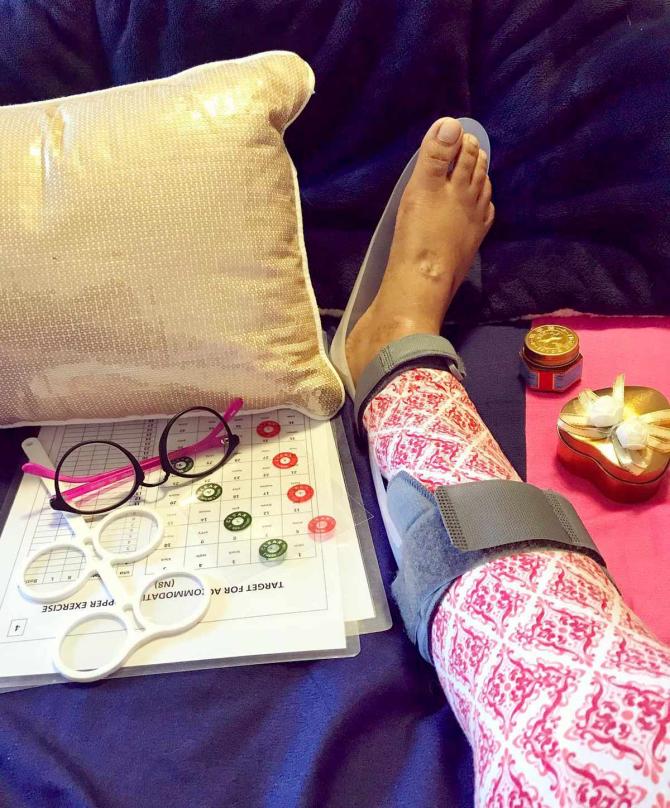
'Both my legs are disfigured; I have a foot drop in my right leg and there is no sensation in my left foot. If I walk without a splint for a minute, the pain is unbearable. I am highly accident prone,' she says, as she battles with pain every day with a smile on her face.
The accident that changed my life
May 26, 2002. It's a date I will never forget.
It was the summer vacation after Class 8 and I was having a wonderful time.
Then, this incident happened in my house. Before I knew what was happening, a grenade exploded in my hands. And my hands were gone. My legs were a gory mess. There was significant damage. I had multiple fractures. There were splinters in both my legs. My left leg was upside down.
The worst damage was nerve paralysis.
I was hospitalised and bedridden for 18 months.
The doctors and nurses would clean my wounds and dress them up every day till they healed to a point where they could finally operate on me. I underwent several surgeries.
For six months, they used external fixators because my leg wasn't in one piece. Iron rods were placed inside my legs to keep hold them together. It was very painful.
I would never wish that pain on anyone. The skin below the knee had to be cut open so that they could operate.
They took skin from both my thighs to cover the wounds and help new skin grow there. They took the external protective layer of my skin to cover the wounds on other parts of my body. So, like most of you, I don’t have that extra protection. In extreme weather conditions, my thighs burn and hurt a lot.
Because I was bedridden for so long, I had bed sores.
My initial surgeries happened in Jaipur. In 2003, I was shifted to Chennai.
I had casts on both my legs. I remember they were blue in colour.
Even after the surgeries, it took me two years to take my first step out of bed.
Apart from physical and emotional pain, I missed so many things in those 18 months.
I missed the whole of Class 9 and three quarters of Class 10.
In December 2003, the plaster was removed and I took my first step with the help of crutches.
Back then, I used to write letters to my friend in Bikaner. I realised everyone was preparing for the Class 10 exam in April. The thought of not writing the board exam bothered me.
I had other thoughts too: How will I eat, brush, comb my hair? How will I take care of myself?
My body had become something I did not know any more. I had to relearn every normal physical activity in order to be independent.
Every task required a lot of patience. But my mom was with me. She never left my side. She was my roommate in the hospital.
After the surgery, I was left with a protruding bone on my right hand, not covered by flesh. If I hit my hand against something, the pain was so agonising that I felt I would die from it.
But, with time and a lot of practice, I have learned to use the bone like a finger.
I trained myself to use the tip of my elbow to hold things like a brush, a book. Later, I was fitted with a myo-electric hand so I could hold a pen.
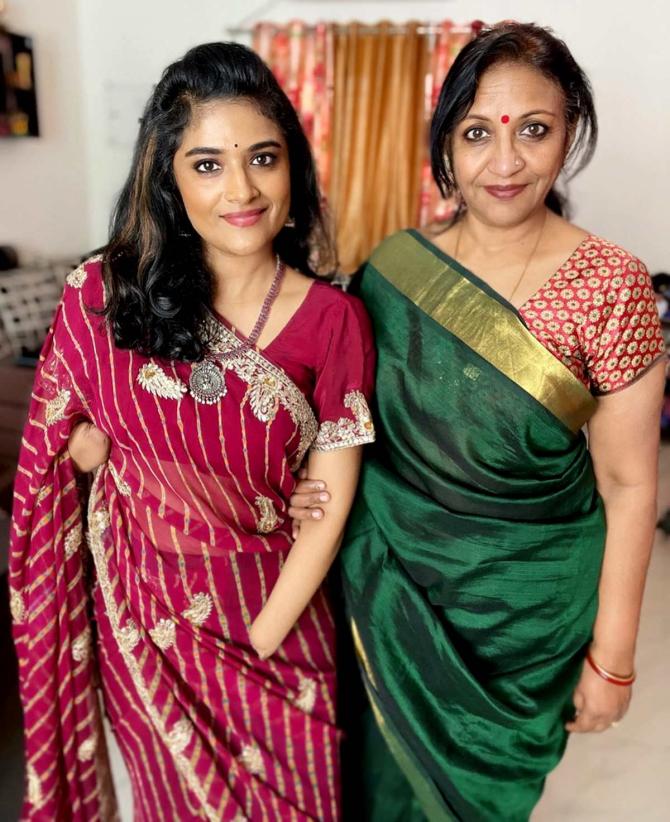
Class 10 results: The turnaround
With three months left to go (for the Class 10 examination), I asked my mom if it would be possible for me to appear for the board exam as a private candidate. She said yes. In fact, she would say yes to everything I asked.
I enrolled at a private coaching centre in Chennai and appeared as a private candidate.
While I managed to cover the syllabus in three months, I knew I would need a writer; I had to learn to dictate my answers in math, science and geometry, explain the diagrams, calculations, etc.
Between January and March 2004, I prepared and worked hard and wrote the exam with the help of a writer.
In May 2004, on approximately the second anniversary of my accident, the Class 10 results were declared.
I scored 97 per cent with 483 marks out of 500; I had a perfect 100 in math and science and 97 in Hindi. I topped the state in Hindi that year.
While checking the results, my mom saw 100 written twice so she was like: How many marks out of 100? It took us a while to register that I had scored 100 out of 100.
Those results changed my life. I was contacted and interviewed by several newspapers and media channels, including television and radio; we shared everything we’d faced as a family.
The next seven to 10 days were thrilling.
That was the first time I realised I had come a long way and must accept this new body and way of life. I decided I wouldn't let anything stop me.
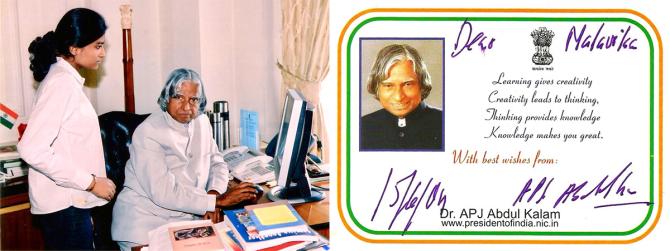
Meeting President Kalam
The then President Dr A P J Kalam read my story and reached out to me. I was invited to Rashtrapati Bhavan in Delhi with my parents.
We walked the red carpet and it was a surreal experience.
We sat in front of him in his room. He spoke to me in Tamil and asked about my future plans, what I'd like to study, etc. He showed me his computer and talked about the work he was involved in. That's when we clicked a picture.
It was a memorable experience that motivated me to pursue my higher education.
I got 95 per cent in Class 12.
As I could barely walk or stand a few minutes, I knew that education would be instrumental in helping me achieve what I wanted to gain in life.
I loved economics so I enrolled at St Stephen's in Delhi. After my graduation, I did a master's degree in social work from the Delhi School of Social Work.
In 2011, I moved to Chennai where I completed MPhil with distinction.
I cleared UGC-NET (this University Grants Commission entrance examination determines the candidate's eligibility for the post of assistant professor and/or junior research fellowship award in Indian universities and colleges) for social work with distinction and won a junior research scholarship.
I chose to research on diversity and inclusion of disabled people in Chennai; it was the best subject I could take. Being part of inclusive education, being around people just like me was a wonderful experience.

In 2012, I won the Rolling Cup for the best MPhil thesis and completed my PhD in 2017.
I wrote my entire thesis with the bone that protrudes from my right hand, which I call my extraordinary finger (laughs).
It was my mom’s dream to see me independent and with the title of 'Dr' in front of my name; she worked very hard to help me achieve that.
Scoring these marks and completing my education made me feel confident and encouraged me move forward.
My mom stood by me like a rock throughout; her strong will and determination inspired me to keep going.
My father did everything he could and helped me financially.
My elder sister had an equally important role to play. She is two-and-a-half years older to me and very hard-working.
She lost a bit of her childhood after my accident because my parents had to focus so much on me. Life also changed for her. But she rarely complained and took care of me like a mother figure.
After my MPhil, my mother told me, "Having experienced inclusion and discrimination first-hand, your voice can be more powerful. Who can motivate people if not you? You never gave up."
That's how I gave my first TEDxYouth Talk in Chennai and became a motivational speaker.
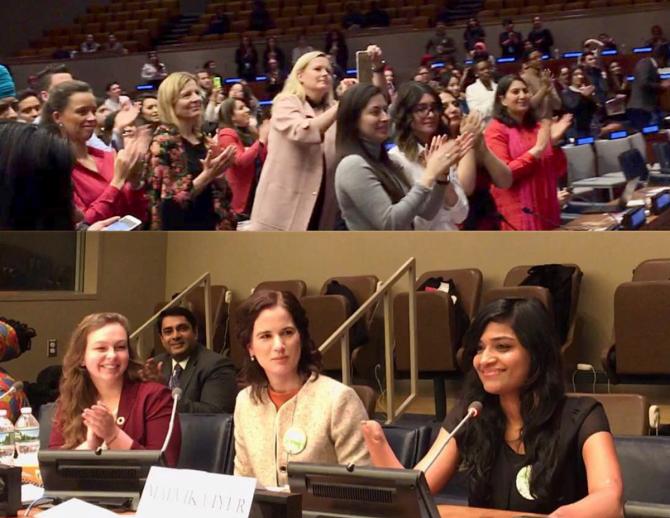
Importance of inclusion
As a disabled person who has endured so much, I can tell you that inclusion is a very important word.
It doesn't matter where you are from, how you look, what you wear... inclusion acknowledges your unique abilities and diversities.
Disabled or not, we are all so different, we have so many talents and we bring so much to the table. And we need to celebrate the truth of who we are with the world.
When I was 14 and yet to be fitted with prosthetic hand, I picked a pen, tied a rubber band to my arm and started to write. I was always looking at ways to make my life easier.
If you closely observe people with disabilities, they have such unique creative minds. They are always looking at simple solutions to everyday problems. And that is exactly why we need inclusion.
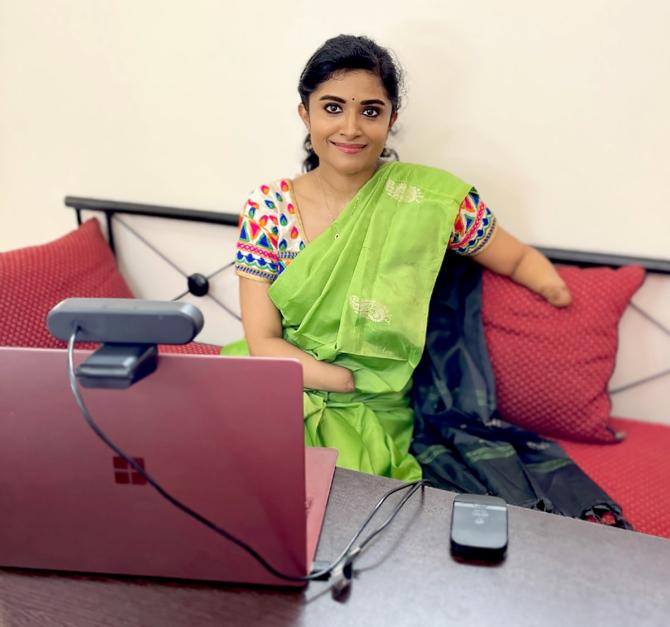
Apart from disability, she also highlights and supports causes like gender equality, child rights, mental health, universal design and accessibility at NGOs and youth forums around the world.
Disability in India: Dealing with stigma
It is challenging to be a person with disability. You need a different kind of assistance.
But that's not the real challenge. What hurts the most is when people pity me.
Even when I was the hospital, so many people would say: "Bechari ladki", Paavam ponnu" (unfortunate girl); "What is she going to do with her life? She can't go back to school. Who will marry her now?"
These insensitive comments would hurt me more than my physical wounds. Because none of it is true.
The stigma that you are cursed, that you are a burden or a liability is much more painful than the disability.
It is important to understand that the disability is not in the person. The problem lies is in attitude and the discriminatory treatment given to disabled people.
For example, ramps make it easier for disabled people to travel comfortably, feel more independent and realise their true potential. But having a ramp available is still so rare in our country.
I've used my knowledge and research to become a motivational speaker and corporate trainer. In my talks around the world, I share my story of hope and talk about diversity, inclusivity, accessibility and mostly importantly, mental health.
In all my videos, talks and workshops I explain how I am leading such a fulfilling, meaningful life.
My quality of life has improved so much. I get to share my knowledge with people around the world. How is it possible to pity me?
I urge people to focus on the ability of people with disability. Stop discriminating. Learn to be sensitive to their needs, so we can be loved and respected for who we are.
We need to try and share as many positive stories about disabled people instead of labelling them negatively.











 © 2025
© 2025